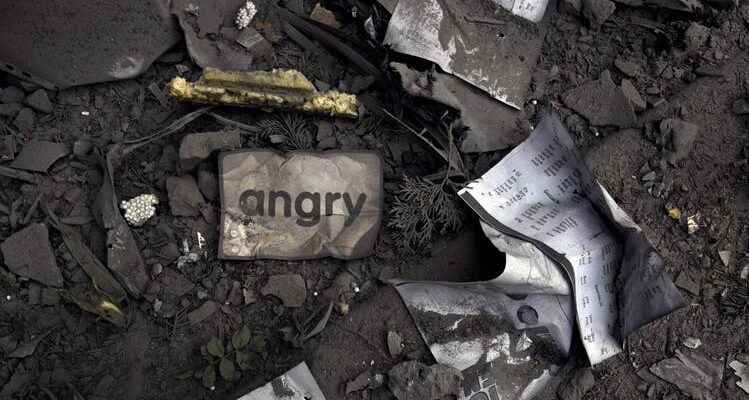Sergei Gerasimov is holding out in Kharkiv. In his war diary, the Ukrainian writer reports on the horrific and absurd everyday life in a city that is still being shelled.
Remnants of a bombed school in Kharkiv.
November 23, 2022
The old woman has large, yellow teeth with gaps. When she speaks, I look at those teeth with embarrassment and a little pity, for she often repeats the old pre-war Russian propaganda slogans. She lives in what is probably one of the most devastated places in Kharkiv and still trusts what she heard on Russian television nine months ago.
Modern information technologies make it possible to format people to believe any cruel nonsense. I still consider myself a free person, but who knows what the propaganda is doing to my brain right now? Of course, Ukrainian propaganda is more discreet and far less aggressive than Russian, but it’s probably only a matter of time before it makes me believe a given message.
When I stop staring at the woman’s teeth, I look up and see that the clock hanging over the white door in the bottomless room is actually working: its minute hand has moved.
“I was so happy to live with my son and always have him close to me,” says the woman, “but we had to flee – after all that.” She points to the floorless rooms hanging over our heads.
“We hid in the Heroiv Truda subway station,” she says.
She tells me how they lived there for three months, sitting and sleeping on the stairs. When her back began to hurt unbearably, the old woman allowed her son to leave her and go outside. When he came back he had some wooden boxes with him and told about men dressed in black who had chased him to put him in the army.
“You should never let someone out during the day,” says the woman. “If you really have to go out, go after curfew.”
“But then they will arrest you,” I say.
“There are no police here at night,” she says.
The wooden boxes didn’t help much, so the woman and her son had to leave the metro station and seek shelter elsewhere. They rented a room for a month, but it was incredibly expensive and they ran out of money.
“How much did you pay?” I ask, but she doesn’t want to answer.
“We spent all our money,” she says, “but my son was always with me and I felt like a happy woman.”
But then came the day when she had to let her son go again. He said he wanted to find a cheaper room to rent. She waited a whole day for his return, then two days, then a week, but he didn’t come back. The phone remained silent.
The number isn’t working – that’s what she heard every time she tried to call him.
“It’s good when they say so,” she says.
“What makes you think of that?” I ask.
“Because it means my son has crossed the border and is now somewhere in Europe. It means he’s safe.”
I think being out of order can mean a lot of different things, most of which don’t bode well, but I just nod.
“Would you like to buy water?” I ask the woman, and she looks down at the empty plastic bottles in her hands.
“Of course not!” she says, surprised. “You can’t buy water anywhere here. We get the water from a spring. It’s the best water I know. Follow me, I’ll show you where she is.”
We go down the hill together. As we pass a flock of surly, disheveled pigeons, she calls the birds by name and apologizes for not having any bread. Then we see a stream and wild ducks swimming on the water. You are not afraid of us.
We stand before the source she spoke of. Countless people fill their bottles there. I realize that without this source they cannot survive.
“The damn people killed and ate most of the ducks,” says the old woman angrily. She knew some of the slaughtered ducks by name.
To person

Sergei Gerasimov – What is the war?
Of the war diaries written after the February 24 Russian invasion of Ukraine, those of Sergei Vladimirovich Gerasimov are among the most disturbing and touching. They combine the power of observation and knowledge of human nature, empathy and imagination, a sense of the absurd and inquiring intelligence. Gerasimov was born in Kharkiv in 1964. He studied psychology and later wrote a psychology textbook for schools and scientific articles on cognitive activity. His literary ambitions have so far been science fiction and poetry. Gerasimov and his wife live in the center of Kharkiv in an apartment on the third floor of a high-rise building. The NZZ published 71 “Notes from the War” in the spring and 69 in the summer. The first part is now available as a book on DTV under the title «Feuerpanorama». Of course, the author does not run out of material. – Here is the 66th contribution of the third part.
Translated from the English by Andreas Breitenstein.
